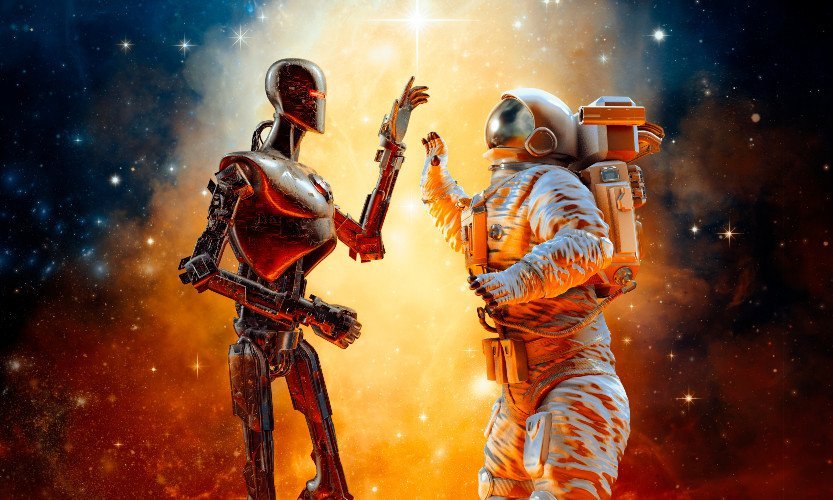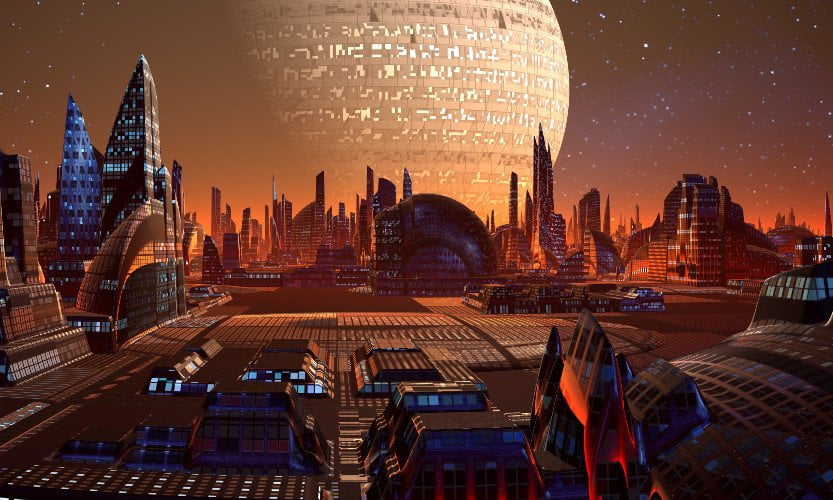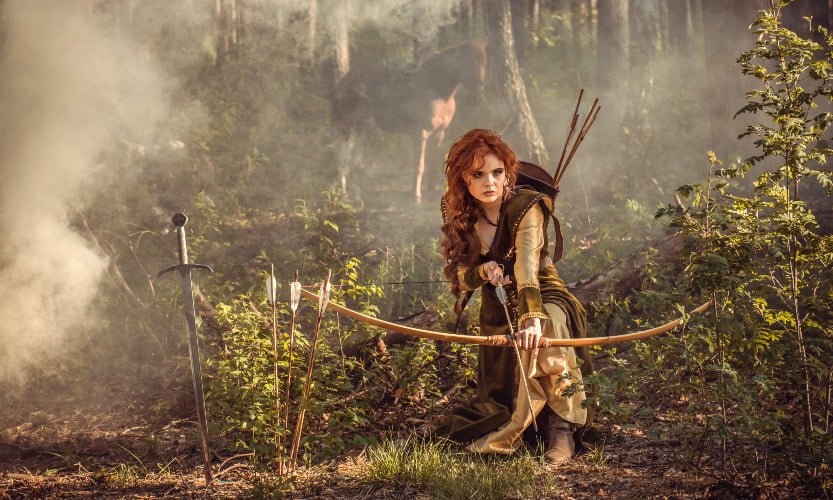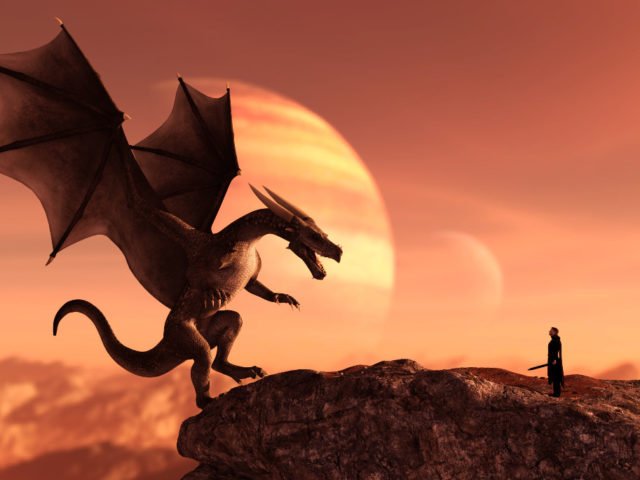Science fiction and fantasy are my go-to, both for reading and watching on television, but also when writing my own stories. I always thought I understood the difference between these genres, so imagine my surprise when my science fiction book was marketed by my publishers as fantasy.
In hindsight, this misunderstanding wasn’t surprising. Fantasy and science fiction as genres have considerable overlap. But understanding what makes these genres distinct will enable you to hone your writing to the right audience, enhancing reader enjoyment and helping at the marketing stage.
So let’s explore the specific elements of both genres, what makes the genres different and the same, and why this understanding is so important.
What Is Science Fiction?
If you were anything like me as a kid and switched off during science lessons, then a quick Google will remind you that science is the study of the physical and natural world through experiments, observations, and measurement.
So the science fiction genre is exactly as it sounds: fiction grown from scientific principles and theory. A weaving of storytelling with the laws of nature and physics.
Science fiction explores scenarios that are possible, at least with scientific advancement, making them all the more relatable and frightening.
For someone science-adverse (like me,) it turns something stale into something wonderful and intriguing, binding science to emotions, humanity, the imagination, and ethical quandaries. I didn’t enjoy science as a student, but my rucksack was brimmed with science fiction novels by the likes of Asimov and Orwell.
The Key Elements Of Science Fiction
Science fiction tends to embrace advanced technology such as time travel or space travel, and/or a dystopian setting, where society embodies grave injustices or suffering.
These science fiction elements allow readers to explore important, often scary, ethical or theoretical questions from the safety and comfort of their sofas.
For example, will the ability to alter the past help or harm people? How can we spot the warning signs and stop our society from completely disregarding the rights of women? How can scientific development aid good and evil in this world and beyond?

Examples Of Science Fiction Stories
A Clockwork Orange By Anthony Burgess
A novel set in a dystopian world where criminality can be influenced by behavioural principles. This story draws on the psychological theory of behaviourism, but also poses a broader ethical question: is freedom of choice more important than the prevention of evil? This story blew my sixteen-year-old mind.
Station 11 By Emily St. John Mandel
A brilliant novel about a terrifying new virus. Sound familiar? This novel was written pre-covid, demonstrating how science fiction can be so grounded in reality, that it often has a predictive quality.
The Secret Deep By Lindsay Galvin
A wonderful example of middle-grade science fiction, wherein the DNA of mermaid-type creatures is used to enable people to breathe underwater. Such a great book for making science interesting for children.
Starship Troopers By Robert A. Heinlein
This exciting novel is a great example of military science fiction, a subgenre of science fiction that focuses on weapons and war. This genre is particularly scary as technological advancements are moving so quickly, that some of these ideas may soon be a reality.
The Loneliest Girl In The Universe By Lauren James
This brilliant YA novel is not only set in space, a popular science fiction setting, but was apparently inspired by a question on special relativity from Lauren’s university physics course (for those who don’t know, special relativity is a theory explaining how speed affects mass, time and space.) It’s a lovely example of how science fiction is often birthed from real-world ‘what if… ?’ questions.
The Martian By Andy Weir
This novel follows an astronaut’s struggle to survive on Mars. This is a great example of hard science fiction, a subgenre that embraces scientific accuracy.
What Is Fantasy?
Unlike science fiction, fantasy deals with the impossible. Think magic and the supernatural. As such, it’s firmly rooted in the imagination rather than in science and natural laws.
The Key Elements Of Fantasy
The main elements of fantasy are mythical creatures, magical worlds, and the supernatural. These elements are so distinct from the real world, that they allow the reader complete escapism from the mundane. They also fully engage the imagination, something that has been shown time and time again to improve children’s development.
However, as adults, we tend to move away from imaginative play and fantasy worlds, and as we conform to society, so too can our dreams and creativity. Fantasy novels allow us to tap back into this freeing, fun, and creative state, where anything is possible.
Extensive world-building is another vital element of the fantasy genre, and writers often create entirely new histories, languages, religions, and cultures.
For my soon-to-be-published young adult fantasy novel, I devised a new religion and went as far as writing a handbook; a level of worldbuilding that isn’t unusual for fantasy writers.
World building makes the impossible believable and results in a deeply immersive experience for the writer, and ultimately, the reader. There’s a reason fantasy has some of the biggest fandoms like Twilight and Lord of The Rings. Not only do they inspire grown-up imaginative play, but the vastness of the imagined worlds encourages exploration through clubs, fanfiction, and fanart.

Examples Of Fantasy Stories
The Priory Of The Orange Tree By Samantha Shannon
This feminist reimagining of George and the dragon is a novel rich with world-building and mythical creatures. The original tale is from the 11th century, demonstrating the longevity of the fantasy genre, probably because our capacity to imagine and dream is a central part of our humanity that transcends time.
Pan’s Labyrinth
This beautiful film shows how fantasy can be combined with real-life history. In this case, mythical creatures and magical quests are blended with the very real Spanish Civil War.
The Last Days Of Jack Sparks By Jason Arnopp
This clever novel follows an arrogant journalist to his death after he angers the devil during an exorcism. It falls into the fantasy genre because it deals with the supernatural, yet it also falls into several other genres including horror, thriller, and suspense.
Snowglobe By Amy Wilson
This beautiful story about a girl who can jump between worlds contained within snowglobes shows how fantasy fiction can help children explore big issues in a safe way. In this case; loss, coming of age, and the responsibility that accompanies power.
The Gilded Ones By Namina Forna
This thrilling young adult fantasy novel is about the persecution of supernatural creatures, specifically demons, by mankind. The story is told from the point of view of a demon, flipping the traditional idea that demons are evil on its head. It’s particularly original and immersive and explores themes of the ‘other’ and of embracing difference.
Fantasy Vs Science Fiction
The main difference between fantasy and science fiction is that fantasy deals with the impossible, whereas science fiction deals with the possible.
Fantasy features magic and monsters, the realm of the imagination, and science fiction is grounded in scientific principles.
Both genres need internal consistency and logic, but in fantasy, the writer creates the rules, whereas, in science fiction, nature and physics dictate the rules.
In spite of these differences, significant overlap remains. Both science fiction and fantasy imagine worlds different from our own, and both deal with the hypothetical. Indeed, the similarities are so pronounced, it isn’t uncommon to blend both categories resulting in a genre known as science fantasy or fantasy science fiction. A great example of this is Star Wars. The setting is space, yet the force is magical.
Another key similarity is that the imagined elements of the external world heighten the internal conflicts and the goals of the protagonist. For example, in my fantasy novel, Antigua de Fortune of the High Seas, the main character must embrace her magical powers in order to heal the rift between magical sea creatures and mankind. At its core, her character arc is simple: you do you. But it wouldn’t be nearly so exciting if her self-discovery didn’t involve ocean magic.
Understanding these differences enables writers to tailor their books for specific audiences, therefore enhancing sales and reader enjoyment. This becomes especially important during marketing, ensuring your book reaches the target audience. Indeed, classification can be decided at the marketing stage, like in my debut novel, as the publisher considers which market is more buoyant or better suited to the story.

Frequently Asked Questions
How Are Fantasy And Science Fiction Similar?
Both fantasy and science fiction imagine worlds that are different from our own and deal with questions of ‘what if?’ As such, they both encourage the reader to keep an open mind – perhaps this is why both genres are particularly good at exploring broader ethical, philosophical, and emotional themes.
Both genres often blend existing history or culture with new and imagined elements, and also use the external elements of the genre, be that monsters or technology, to heighten the stakes and the internal conflict of the protagonist.
Can Science Fiction Also Be Fantasy?
Absolutely. Science fiction can have magical or supernatural elements. Think The Time Machine by H.G Wells, where the protagonist time travels to a fantasy land. Likewise, fantasy can include scientific elements, for example, The Avengers utilises advanced technology.
This blending of genres can be called science fantasy or fantasy science fiction. Sometimes the classification happens at the marketing stage, a decision informed by the popularity of a genre at the time of publication.
Can Science Fiction Have Magic?
Another resounding yes! Whilst you’re unlikely to find magic systems in hard science fiction, magic can exist in soft science fiction and other science fiction genres. Think Avatar, which is set in space, explores genetic engineering and contains elements of military science fiction, yet also contains a soul tree, central to the Na’vi’s spiritual belief system.
Also, supernatural powers can originate from science (think The X-Men by Jack Kirby and Stan Lee) and magic can arise from technology or affect technology, sometimes known as technomancy or technomagic. An example of this is The Last Days of Jack Sparks, by Jason Arnopp, where supernatural forces hijack social media.
Science Fiction Vs Fantasy: The Take Home
Both genres have huge merits. The plausibility of science fiction means the story falls closer to home, making the hypothetical all the scarier, whereas fantasy allows the reader to escape reality and tap back into a time when make-believe was encouraged.
Whilst it’s important to understand the differences and similarities between the genres, the most important thing is to write what works for your story and what sparks your own imagination.
Now that you understand the difference and similarities between these wonderful genres, you can unleash your creativity and let your imagination run wild.
Jericho Writers is a global membership group for writers, providing everything you need to get published. Keep up with our news, membership offers, and updates by signing up to our newsletter. For more writing articles, take a look at our blog page.










